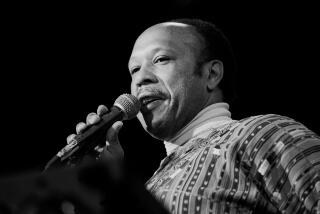DANCE REVIEW : Ailey’s ‘Opus McShann’ Given Its L.A. Premiere at Wiltern
- Share via
Five years ago, Alvin Ailey fashioned a valentine to Charlie Parker, “For Bird--With Love,” that replayed moments from the jazzman’s difficult life in broadly drawn dramatic scenes set to music by Parker and others.
In a curtain speech before Wednesday night’s performance by the Alvin Ailey American Dance Theater at the Wiltern Theatre, the choreographer explained that his new tribute to Kansas City jazz pianist Jay McShann was a “prelude” to the earlier piece.
Seeing the two works back-to-back made the connection clear in terms of individual details, like the reappearance of the McShann figure as the Progenitor in “Bird.” Yet “Opus McShann” (a Los Angeles premiere) veered off in an unfocused and dramatically miscalculated fashion.
It opens with a figure in a fuchsia satin suit (Dudley Williams) who settles himself on a chair on top of a platform painted like a piano and proceeds to mime McShann-the-performer to one of his vintage recordings.
Soon the scene becomes a lively bordello with teasing women and predatory men (the setting of McShann’s earliest musical life). Two guys (Carl Bailey and Gary DeLoatch) do a nifty jelly-legged, stumble-step set piece. Eventually, with the why-not logic of musical comedy, there is a spate of jitterbugging (choreographed by swing dancers Frank Manning and Norma Miller).
But peculiar sounds begin to emanate from the tape, heralding the arrival of four members of the Ku Klux Klan in their white robes and pointed hats. They frighten the dancers away. McShann gestures at them in a rather grand and stately manner and they rapidly take their leave. Then everybody comes back and it’s on with the show.
The attempt to combine the whorehouse ambiance with the look of popular dances from the ‘30s and a mini-morality play about the way black society carried on despite threats by segregationists pulls the piece in too many directions. It doesn’t illuminate the essential nature of the composer whose music we’re hearing.
And while “To Bird” has at least a few sharply etched pure-dance moments--like the ecstatic writhing of a woman across a church bench--virtually all the bits and pieces of dancing in “Opus McShann” seem on the same uninflected level of genial entertainment.
Also on the all-Ailey program were two familiar repertory items: “Streams” (1970), in a finely articulated performance, and “A Song for You” from “Love Songs,” (1972), with Williams communicating in eloquent arm-language.
More to Read
The biggest entertainment stories
Get our big stories about Hollywood, film, television, music, arts, culture and more right in your inbox as soon as they publish.
You may occasionally receive promotional content from the Los Angeles Times.










